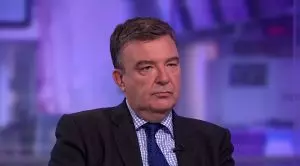 As Casino Guardian has already reported, the UK Labour Party was up to propose a new gambling tax, with the money gathered from it aimed to be redirected to fund National Health Service (NHS) programs for problem gamblers. Tom Watson, the deputy leader of the Labor and the shadow culture secretary Jon Ashworth got to Brighton to officially present the party’s review into problem gambling.
As Casino Guardian has already reported, the UK Labour Party was up to propose a new gambling tax, with the money gathered from it aimed to be redirected to fund National Health Service (NHS) programs for problem gamblers. Tom Watson, the deputy leader of the Labor and the shadow culture secretary Jon Ashworth got to Brighton to officially present the party’s review into problem gambling.
Last night, Channel 4 Presenter Cathy Newman talked about the controversial fixed-odds betting terminals (FOBTs) with Malcolm George from the Association of British Bookmakers (ABB) and the former gambling addict Matt Zarb-Cousin.
The discussion brought to light some of the two parties’ concerns related to the machines, as well as their main arguments for and against the possible reduction of fixed-odds betting terminals’ maximum stakes. With FOBTs being one of the hottest topics in the UK gambling industry, Cathy Newman put ABB’s Malcom George and Matt Zarb-Cousin against each other to share their thoughts on the possible changes that could be brought to he machines’ regime.
Are FOBTs Actually So Dangerous to UK Gambling Addicts?
 As mentioned above, Ms. Newman talked with Malcom George from the Association of British Bookmakers and Matt Zarb-Cousin, a former gambling addict, former spokesperson for Jeremy Corbyn and a present spokesperson for the Campaign for Fairer Gambling about the measures that could be taken in order for the FOBTs’ negative effects to be minimised.
As mentioned above, Ms. Newman talked with Malcom George from the Association of British Bookmakers and Matt Zarb-Cousin, a former gambling addict, former spokesperson for Jeremy Corbyn and a present spokesperson for the Campaign for Fairer Gambling about the measures that could be taken in order for the FOBTs’ negative effects to be minimised.
Ms. Newman cited some of the most recent surveys of the UK Gambling Commission (UKGC), the country’s regulatory body that oversees and regulates the local gambling industry, saying that a massive increase in the number of problem gamblers has been registered in the last three years. According to a UKGC survey, there were 280,000 problem gamblers in the country in 2012, while their number almost doubled to 430,000 in 2015.
The Chief Executive Officer of the Association of British Bookmakers, Malcolm George, did not agree that the results of the latest UKGC survey about problem gambling were worrying. In fact, he insisted that the results were “statistically stable”, saying that was an expression used by the UK Gambling Commission itself. He even explained that the figures revealed by the Commission’s survey were perfectly normal, as twenty years ago, a gambling survey showed between 0.5% and 1% of the population were problem gamblers, and this percentage ratio remained the same at present times, despite the fact that nowadays there are many more gambling options available to players.
Furthermore, Mr. George said that the problem with fixed-odds betting terminals across the UK is totally overrated. According to him, the root of the problem with FOBTs has nothing to do with the potential chance of losing £18,000 in a single hour. ABB’s CEO said that figure was “totally unrealistic” and that any other of the gambling options available in the country, including casinos, betting shops, amusement arcades and online gambling, could have significantly worse impact on local players when it comes to problem gambling.
Matt Zarb-Cousin’s Intolerance to FOBTs
 As mentioned above, Matt Zarb-Cousin, a former gambling addict and Jeremy Corbyn’s spokesperson and a now-spokesperson of the Campaign for Fairer Gambling, also took part in the discussion. Mr. Zarb-Cousin, who is known for his extreme intolerance of the high stakes offered by the fixed-odds betting terminals, commented on the local authorities obligation to ensure a fair and risk-free gambling environment for UK players.
As mentioned above, Matt Zarb-Cousin, a former gambling addict and Jeremy Corbyn’s spokesperson and a now-spokesperson of the Campaign for Fairer Gambling, also took part in the discussion. Mr. Zarb-Cousin, who is known for his extreme intolerance of the high stakes offered by the fixed-odds betting terminals, commented on the local authorities obligation to ensure a fair and risk-free gambling environment for UK players.
He said that “self-exclusion is something you do once you have already addicted, and once you have already lost more than you can afford. To that extent you are already addicted”, and what the campaigners of the Campaign for Fairer Gambling are trying to do is prevent addiction before it actually happens.
According to Mr. Zarb-Cousin, one of the main responsibilities of the UK bookmakers is to make sure they offer products that are safe. However, fixed-odds betting machines seem to be anything but safe, considering the increasing number of compulsive gamblers on the territory of the country. He cited a recent survey, according to which 43% of FOBTs customers are already problem gamblers or are put at risk to becoming such.
What makes Mr. Zarb-Cousin such a fierce opponent of fixed-odds betting terminals is the fact that local gambling addicts lose more money on the machines than on any other type of gambling activity, as well as on several leading gambling activities combined. Speaking of the safety of UK bookmakers’ products, he shared that FOBTs are a highly-addictive product “because of the £100 stake, because of the speed of play and because of the addictive casino content” offered by them and classified them as a “Class A gambling product”. That is exactly why the Campaign for Fairer Gambling aims at making the product safer, and in order for this to happen campaigners believe that the UK Government must reduce the maximum stake allowed at the machines.
UK FOBTs Issues
 Fixed-odds betting terminals are becoming a hotter topic by the hour, especially considering the fact that the industry awaits the UK Government’s review to be officially rolled out soon. The machines have recently been one of the major concerns of local authorities and charity organisations dealing with problem gambling, as they have been pointed as the gambling services which lead to most gambling addictions.
Fixed-odds betting terminals are becoming a hotter topic by the hour, especially considering the fact that the industry awaits the UK Government’s review to be officially rolled out soon. The machines have recently been one of the major concerns of local authorities and charity organisations dealing with problem gambling, as they have been pointed as the gambling services which lead to most gambling addictions.
The large maximum stakes, combined with the high-speed gameplay have been considered the major disadvantages of the terminals which led to massive money losses and serious consequences for affected players. The thing is that the local industry and the major gambling companies that operate FOBTs have been concerned about the consequences from a possible crackdown that could end up with a massive reduction of FOBTs’ maximum stake from £100 to £2. On the other hand, such a reduction would also seriously decrease the money that fixed-odds betting machines bring to the country’s economy, and the Government could not afford losing these money.
Various non-profit organisations, as well as Members of Parliament have called for more serious measures to be adopted in terms of fixed-odds betting machines, so that local players are better protected. Customers’ safety has always been a top priority of the local authorities, so the Government has been considering more serious measures to be imposed on the UK gambling industry, so that less players are affected by problem gambling behaviour. The Government is expected to officially present its review of the local gambling market, and more specifically, of FOBTs in October at the earliest.
- Author


